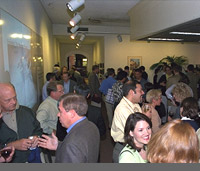Pub Talk
POWER PUB: THURSDAY, FEBRUARY 12, 2004
"IPv6 vs. EPC: A FACE OFF ON THE RFID BATTLEGROUND"
Co-Pub Master: Dr. Rohit Gupta, Group Leader, NPTest, Inc. & Research
Associate, Silicon Valley World Internet Center & Mr. Dinesh Vadhia,
Founder, FortyOne, Inc.
5:00 p.m.: Networking
5:30 p.m.: Pub Exchange
6:30 p.m.: Networking
7:00 p.m.: Pub Closes!
Open to the Public. Fee: $15 (cash or check, payable at the door).
To view the Power Pub presentation, click Here.
(377kb .pdf)
As the marketplace for RFID warms up, questions arise as to the
key choices for the standards affecting the use of tags in supply
chain management and other applications. If the Auto-ID Center's
Electronic Product Code (EPC) is expensive or its standards are
not well defined, the U.S. military could use tags that would carry
a unique Internet Protocol address using the next generation Internet
Protocol called IP Version 6, or IPv6. It expands the length of
Internet addresses to 128 bits, which means that there will be enough
addresses to give one to every item on earth. The U.S. Department
of Defense (DOD) has mandated that its battlefield network use IPv6
by the end of 2006.
Meanwhile, on the retail side of the RFID arena, Wal-Mart announced
in 2003 that it will require its suppliers to place RFID transponders
using EPC technology on pallets and cases by January 2005.
Here is the challenge: DOD suppliers are larger than Wal-Mart's.
They include the likes of Boeing and Lockheed, and therefore if
EPC is not accepted outside of the consumer packaged goods industry,
its success will be incredibly diminished.
Please join us at the Power Pub for a townhall-style discussion
around this issue. Guiding questions for the evening are:
- What are the similarities and differences between IPv6 and
EPC implementation of RFID?
- Which route will be more effective? IPv6 or EPC?
- What are the roadblocks to the implementation of either technology?
ABOUT ROHIT GUPTA
Rohit Gupta is a Group Leader at NPTest, Inc. (http://www.nptest.com/),
which traces its rich history back to 1965 when Fairchild Semiconductor
established an automated test equipment (ATE) division. In 1979,
Schlumberger acquired Fairchild Semiconductor; and in 2003, NPTest
became a private company. Dr. Gupta has worked with clients such
as Intel, AMD, and Sun Microsystems and is responsible for systems
engineering. He also serves as a Research Associate at the Silicon
Valley World Internet Center. His current research topics are RFID
and the Next Generation Internet. Dr. Gupta is also interested in
nanotechnology and is a member of nanoSIG. He graduated from the
University of California, Santa Barbara with a Ph.D. in engineering
and worked on projects for ONR (Office of Naval Research) and DOE
(Department of Energy).
ABOUT DINESH VADHIA
Dinesh Vadhia is the founder of FortyOne, Inc., an RFID middleware
software company. Mr. Vadhia has been a senior marketing management
professional at Oracle and Sun with a track record of winning in
the competitive software market. Mr. Vadhia has a background in
engineering and marketing. Originally from London, England, he received
an MSc and BSc in Applied Math from Cranfield Institute of Technology
and the University of Kent.
Mr. Vadhia passionately believes that of all the standards to come
out of the Auto-ID Center the EPC standard is of the greatest value
and that eventually the RFID.
|
